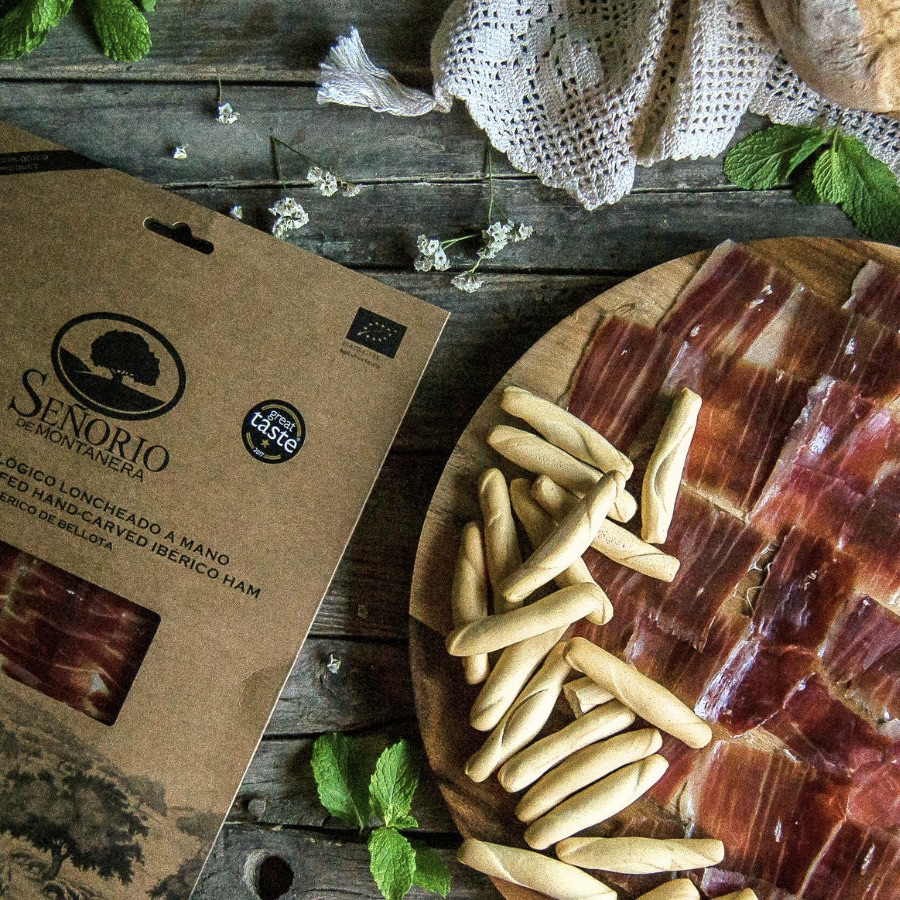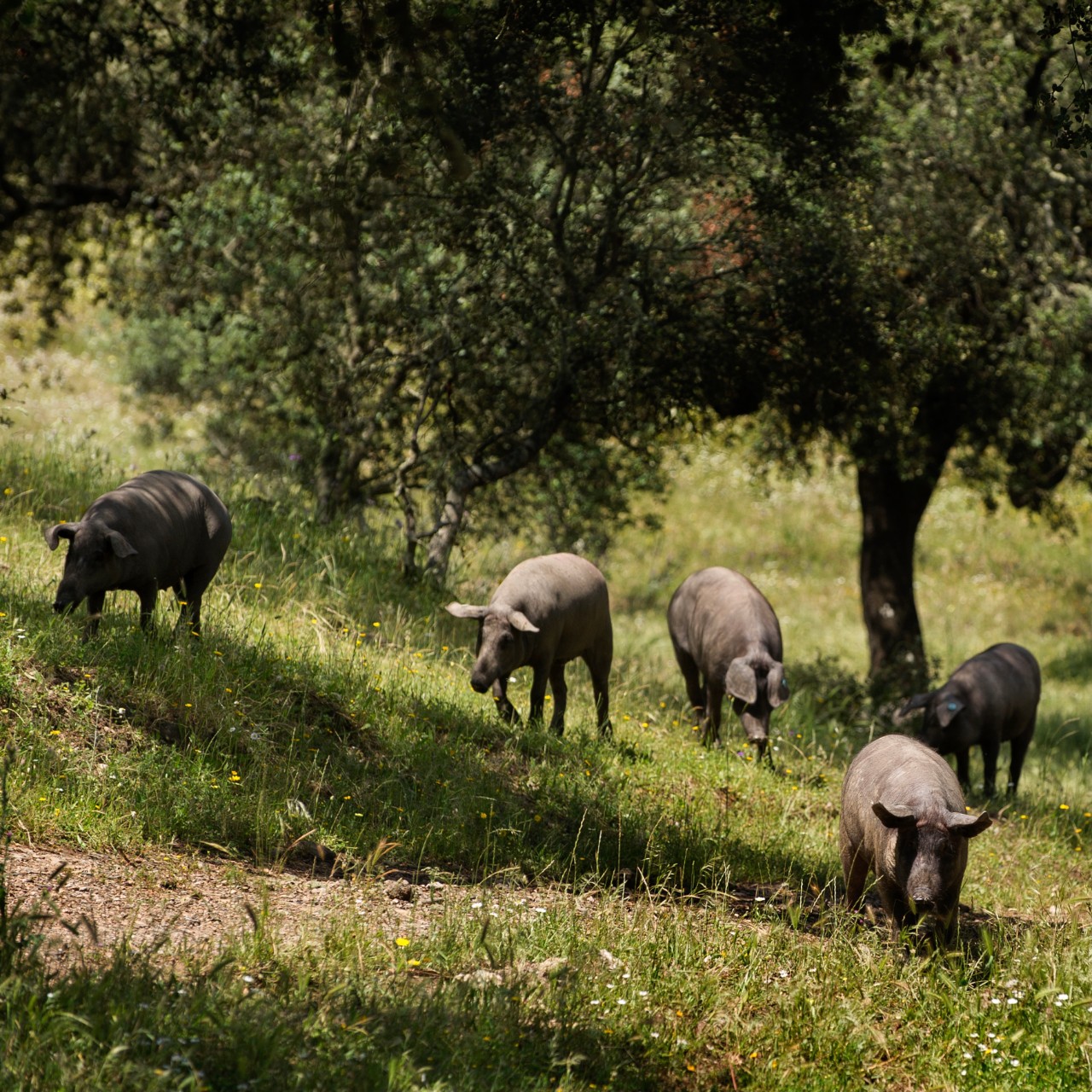by James Badcock - @jpfbadcock
.png.transform/rendition-xs/image_image%20(1).png)
More and more ibérico companies are making organic ham, with organic certification demanded by many markets. We explain how this ham is produced

by James Badcock - @jpfbadcock
Spain's jamón Ibérico is appreciated globally as the finest ham in existence, a unique delicacy owing to the long curing process of up to seven years and the X factor gained from the dark-skinned cerdo Ibérico, fattened on acorns in rolling oak-tree-studded dehesas.
Increasingly, producers are moving into making organic jamón ibérico, equally delicious and totally sustainable due to the avoidance of chemicals in both the pig rearing and ham curing cycles. Gaining official certification as an organic producer is no easy task, but more and more jamón businesses are adopting this path in search of a new consumer – one who wants quality food with a gentle environmental footprint.
Traditional production of jamón ibérico is a highly sustainable activity in its own right, using methods that have barely changed over centuries. The pigs are reared in the great open spaces of the dehesas, foraging for acorns and pasture with human intervention kept to a mínimum.
Señorío de Montanera, a company made up of 75 livestock-breeding partners with 60,000 hectares of traditional dehesa savannah in the regions of Andalusia and Extremadura, brought its first 100% organic Iberian hams to market in 2017. The process began several years earlier with the certification of the pastureland as being free of use of any pesticides or other chemical products and the first pigs reared with 100% organic food.

A complex process
Once roaming amongst the Holm oaks, adult cerdos ibéricos thrive on the acorns they eat from the ground almost all year round, but young pigs are typically reared on cereal-based feedstock after they are weaned, meaning certified organic food must be sourced.
“The process was complex and not without problems and learnings, finally culminating in the birth of our pioneering range of organic products in the ibérico sector,” says Francisco Espárrago, director general and president of Señorío de Montanera.
Señorío de Montanera’s organic pigs are reared outdoors in dehesas certified as organic farming and this production must be kept completely separate from other sites, where traditional methods are being used. Jamón ibérico produce – hams as well as paletas (front legs) and other delicacies made from the rest of the pigs – now makes up between 5% and 7% of the company’s production.
At Extrem Ibérico Puro Extremadura, organic production has already reached 10% of the brand’s own pigs on its 18,000 hectares of Extremaduran dehesa just five years after launching its organic jamón line.
“We moved into organic production due to demand from the market; consumers were asking for it – in Spain and even more so in some other markets,” explains Demetrio Arias, CEO of Agriculturas Diversas, the company to which Extrem Ibérico belongs.
Plenty of flavour
As well as ensuring that the pigs are reared with 100% natural inputs and in a certified organic environment, the curing process in the salting and drying rooms must also follow strict rules and be kept separate from the rest of the company’s production. For the curing process, the salt must be organic and the drying process takes place in natural dryers.
“The result of all of these rules is that the jamón is more expensive to produce, but the consumer can be satisfied that they are getting a totally guaranteed organic product. There can be no doubt about that, and – also very important – the taste is excellent!” says Arias.

Espárrago of Señorío de Montanera agrees that the flavour of the final product is essentially the same as that of jamón ibérico produced the traditional way, but with a slight twist. “It maintains the organoleptic qualities that consumers demand from foods in this category, it has a darker colour and a more traditional flavour, reminiscent of the hams of yesteryear.” To complete the tasting notes, it can be said that the fat is practically transparent. The aroma is warm and dieppe, with nuances of nuts. In the moth it has soft and juicy texture. The flavor is intense and round, slightly salty and sweet.
Prizes and recognitions
Any nerves Señorío de Montanera had about moving into this new market were dispelled when its organic ham won a prize in its first year of production at the 2017 Great Taste Awards in London. Espárrago says the company is slowly expanding its organic production as it struggles to meet growing demand, but the paperwork required in certifying land and livestock sometimes takes more time than producers would like.
In any case, the jamón-producing Iberian pigs being reared – organically or otherwise - across the 3.5 million hectares of dehesa in the southwestern quadrant of Iberia represent a model of food production that is positive for the environment – resources are maintained, rather than overexploited in an intensive process.
The extensive nature of this kind of livestock farming means a low density of animals, with cerdos ibéricos typically enjoying three hectares of pastureland each, meaning there is a low grazing pressure on the land and new trees can grow without being snuffed out by intensive livestock activity.
The oaks that provide the animals with food and shade act as a massive carbon sink, and the covering of grasses prevents the land from being eroded, helping to achieve a balance in an ecosystem that is also home to hundreds of species of wild animals, birds and insects. Going organic helps protect this vital ancient landscape for the centuries to come.